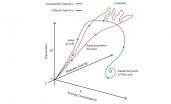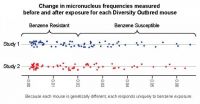Lifestyle education crucial to help young Americans control their blood pressure
Only one in every two young adults with hypertension receives tips on how to lower blood pressure
2014-11-06
(Press-News.org) Far too many "teachable moments" are lost in a doctor's office during which young adults with hypertension could have learned how to reduce their blood pressure. In fact, only one in every two hypertensive young Americans does in fact receive such advice and guidance from a healthcare provider within a year from being diagnosed, says Heather M. Johnson of the University of Wisconsin School of Medicine and Public Health in the US. She led a study which examined how regularly such education is provided and documented by one of the ten largest physician practice groups in the US. The findings¹ appear in the Journal of General Internal Medicine², published by Springer.
Hypertension is the leading cause of preventable death in the United States. Incident hypertension is diagnosed when a person's systolic blood pressure is greater than 140 mmHg or their diastolic blood pressure is more than 90 mmHg. Nine and seven percent of American men and women respectively between the ages of 18 and 39 years old suffer from hypertension. Unfortunately, almost 60 percent of these young adults are not good at controlling their blood pressure, which could lead to heart disease and strokes.
Lifestyle education is seen as a critical initial step to help initiate hypertension control, and could include advice on ways to lose weight, dietary changes and exercise tips. Johnson's team wanted to find out which factors determine the likelihood of such advice being provided within a medical practice. They therefore scrutinized the electronic health records of 500 young adults with incident hypertension who visited a large Midwestern academic practice.
Among the sample group, only 55 percent received documented lifestyle education within one year. Exercise was the most frequent topic addressed, followed by hints on how to stop smoking. Only 25 percent of counselled patients received advice on how they can lower their blood pressure by changing their diets.
Such education was more likely given to women and to patients who made regular visits to the doctor to manage chronic conditions. It was also more often provided to people who had previously been diagnosed with high levels of cholesterol, or those with a family history of hypertension or heart disease.
Johnson believes that such knowledge about when and how patients are likely to receive advice can help to better target the development of interventions to improve young adult health education and hypertension control. Also, the issue could be addressed through changes in the healthcare system that empower additional clinical staff to provide relevant health coaching and lifestyle information.
"The development of incident hypertension is an important 'teachable moment' to educate about the adoption and maintenance of lifestyle modifications," said Johnson.
INFORMATION:
References:
1. Johnson, H.M. et al (2014). Documented Lifestyle Education Among Young Adults with Incident Hypertension, Journal of General Internal Medicine. DOI 10.1007/s11606-014-3059-7
2. The Journal of General Internal Medicine is the official journal of the Society of General Internal Medicine.
The full-text article is available to journalists on request.
ELSE PRESS RELEASES FROM THIS DATE:
2014-11-06
A major new Series on health and ageing, published in The Lancet, warns that unless health systems find effective strategies to address the problems faced by an ageing world population, the growing burden of chronic disease will greatly affect the quality of life of older people. As people across the world live longer, soaring levels of chronic illness and diminished wellbeing are poised to become a major global public health challenge.
Worldwide, life expectancy of older people continues to rise. By 2020, for the first time in history, the number of people aged 60 years ...
2014-11-06
A car powered by its own body panels could soon be driving on our roads after a breakthrough in nanotechnology research by a QUT team.
Researchers have developed lightweight "supercapacitors" that can be combined with regular batteries to dramatically boost the power of an electric car.
The discovery was made by Postdoctoral Research Fellow Dr Jinzhang Liu, Professor Nunzio Motta and PhD researcher Marco Notarianni, from QUT's Science and Engineering Faculty - Institute for Future Environments, and PhD researcher Francesca Mirri and Professor Matteo Pasquali, from Rice ...
2014-11-06
Toronto, ON - For most cancer patients, primary tumours are often not the most deadly. Instead, it is the metastatic tumours - tumours that spread from their original location to other parts of the body - that are the cause of most cancer deaths.
The catalysts behind the formation of these deadly metastatic tumours are believed to be cancer cells that are launched into the bloodstream from the original site of the cancer. Researchers are very interested in leveraging these circulating tumour cells, or CTCs, which have the potential to allow the properties of a tumour ...
2014-11-06
The NASA/ESA Hubble Space Telescope has snapped a striking view of a multiple star system called XZ Tauri, its neighbour HL Tauri, and several nearby young stellar objects. XZ Tauri is blowing a hot bubble of gas into the surrounding space, which is filled with bright and beautiful clumps that are emitting strong winds and jets. These objects illuminate the region, creating a truly dramatic scene.
This dark and ominous landscape is located some 450 light-years away in the constellation of Taurus The Bull). It lies in the north-eastern part of a large, dark cloud known ...
2014-11-06
Engineers at the University of California, San Diego, are proposing a new surgical intervention for children born with a single ventricle in their heart--instead of the usual two. The new approach would potentially reduce the number of surgeries the patients have to undergo in the first six months of life from two to just one. If successful, it would also create a more stable circuit for blood to flow from the heart to the lungs and the rest of the body within the first days and months of life.
Engineers ran computer simulations of the surgery and found it would reduce ...
2014-11-06
Scientists at Helmholtz Zentrum München (HMGU), at Karolinska Institutet (KI), Stockholm and the University College London investigated the function of ciliary cell extensions in the pancreas. Stimulation of the insulin-producing beta cells increases the number of insulin receptors on their cilia. The cilia consequently play an important role in the release and signal transduction of insulin, a hormone that reduces sugar levels.
Defective cilia lead to elevated blood sugar levels and lowered insulin release
The lead author of the paper Dr. Jantje Gerdes, formerly ...
2014-11-06
Human-caused climate change, ocean acidification and species extinctions may eventually threaten the collapse of civilization, according to some scientists, while other people argue that for political or economic reasons we should allow industrial development to continue without restrictions.
In a new paper, two astrophysicists argue that these questions may soon be resolvable scientifically, thanks to new data about the Earth and about other planets in our galaxy, and by combining the earth-based science of sustainability with the space-oriented field of astrobiology.
"We ...
2014-11-06
This news release is available in German.
"The technique makes it possible for the first time to remove large organic molecules from associated structures and place them elsewhere in a controlled manner," explains Dr. Ruslan Temirov from Jülich's Peter Grünberg Institute. This brings the scientists one step closer to finding a technology that will enable single molecules to be freely assembled to form complex structures. Research groups around the world are working on a modular system like this for nanotechnology, which is considered imperative for the ...
2014-11-06
New research reports that the rate of hospitalization due to hepatitis A virus (HAV) infection has significantly declined in the U.S. from 2002 to 2011. Findings published in Hepatology, a journal of the American Association for the Study of Liver Diseases, show that older patients and those with chronic liver disease are most likely to be hospitalized for HAV. Vaccination of adults with chronic liver disease may prevent infection with hepatitis A and the need for hospitalization.
The World Health Organization (WHO) estimates that each year 1.4 million individuals worldwide ...
2014-11-06
A genetically diverse mouse model is able to predict the range of response to chemical exposures that might be observed in human populations, researchers from the National Institutes of Health have found. Like humans, each Diversity Outbred mouse is genetically unique, and the extent of genetic variability among these mice is similar to the genetic variation seen among humans.
Using these mice, researchers from the National Toxicology Program (NTP), an interagency program headquartered at the National Institute of Environmental Health Sciences (NIEHS), were able to identify ...
LAST 30 PRESS RELEASES:
[Press-News.org] Lifestyle education crucial to help young Americans control their blood pressure
Only one in every two young adults with hypertension receives tips on how to lower blood pressure





